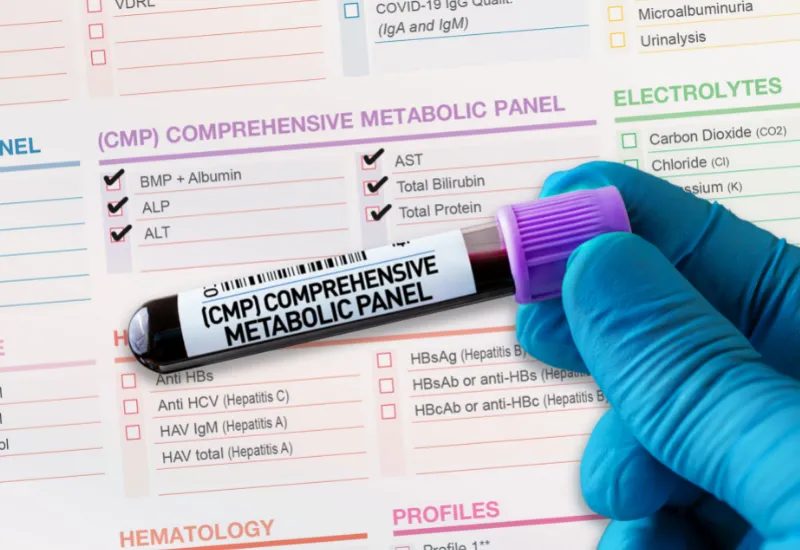The term metabolism is used for the chemical reactions that take place in the body’s cells to convert food into energy in order to maintain the organism’s living state. To get an idea of your body’s metabolism and chemical balance, a doctor might ask you to get a comprehensive metabolic panel. CMP Lab test also goes by the following names; chemistry screen, chem 14, metabolic panel, and CBM.
What Does a Comprehensive Metabolic Panel Measure?
Usually conducted yearly, a comprehensive metabolic panel is a series of blood tests that measure 14 different substances in your body that affect its metabolism. These 14 substances are listed below:
Albumin
This is a protein that is made mainly in the liver. It does the job of preventing blood from leaking out of blood vessels, transporting medicines through the blood, and helping tissues grow and heal.
Blood Urea Nitrogen (BUN)
Urea is a waste product made in the liver when the body breaks down protein, and passes out through the urine. The blood urea nitrogen test measures the amount of nitrogen in the blood coming from urea, and is an indication of how well the kidneys are working to remove urea from the blood. If the kidneys, for some reason, are not performing well, the blood urea nitrogen level in the blood increases.
Calcium
Calcium is the most common and one of the most important minerals found in the body. It plays a part in ensuring the proper functioning of the nerves, the heart, and the muscles. It also helps blood clots, and fixes bones and teeth.
The test for calcium checks the level of calcium in the body that is not stored in the bones, but is in the blood. Our body carefully controls calcium level in the blood. Because the body loses calcium regularly, it is essential to get the required amount of calcium through food.
Carbon Dioxide
Carbon dioxide or CO2 is another waste product found in the blood. After being carried to the lungs through the blood, it is exhaled from the body. Most of the carbon dioxide in the body is in the form of bicarbonate, and this is what is measured in the test.
Chloride
One of the most important electrolytes in the blood, chloride helps to maintain blood pressure, and the pH of the body’s fluids. The intestines absorb chloride when ingesting food. Any extra chloride is excreted from the body through the urine.
Creatinine
Creatinine is a waste product that is produced during the process of metabolism. It is passed out in the urine after kidneys remove it from the blood. If the kidneys have an issue and are unable to function well, the creatinine level in the blood will rise.
Glucose
A type of sugar found in the blood; glucose is the main source of energy that the body uses to function. Because a constantly high blood glucose level in the blood can harm the body in several ways, the pancreas releases insulin to lower its levels when they increase after eating.
Potassium
As a mineral, as well as an electrolyte, potassium helps to maintain the water and electrolyte balance in the body, and is also essential for keeping the muscles and nerves working well. Both high potassium levels and low potassium levels can be problematic, and cause issues like low blood pressure, nausea, and diarrhea.
Sodium
Sodium is also both an electrolyte and a mineral. Sodium level is checked along with other electrolytes such as bicarbonate, potassium, and chloride.
Total Bilirubin
When old red blood cells are broken down by the liver, bilirubin, a brownish yellow substance, is produced. It is excreted from the body through the stool.
Total Protein
The total serum protein test gives the total amount of protein in the blood.
Alanine Aminotransferase
Alanine Aminotransferase is an enzyme that is mostly found in the liver. It is found in lesser amounts in the heart, muscles, pancreas, and kidneys. An alanine aminotransferase (ALT) test measures the amount of ALT in the blood. If ALT level is too high, it is an indication of the liver being diseased.
Alkaline Phosphatase
Alkaline phosphatase (ALP) is another enzyme mostly made in the liver. If ALP level in the blood is abnormally high, the person might be suffering from vitamin D deficiency, bone disease or damaged liver cells.
Aspartate Aminotransferase
Aspartate Aminotransferase (AST) is an enzyme that is found usually in the liver, pancreas, heart, muscles, kidneys, and red blood cells. Normally, AST level in the blood is very low.
However, if an organ such as the heart or liver is damaged, a high amount of AST is released into the blood. Both ALT and AST levels are used to determine the liver’s health.
What is the Procedure of a Comprehensive Metabolic Panel?
Using a needle, a health care professional will take a blood sample from a vein in your arm. The blood will be collected in a small vial. All you will feel is a slight sting when the needle goes in. A bruise might occur at the spot where the needle was put in, but it will go away soon.
Why Do You Need a Comprehensive Metabolic Panel?
This test is usually done as part of a routine physical check-up. However, your doctor might ask you to get a CMP test if he thinks your liver or kidney have a problem. It also checks some other problems, such as diabetes.












